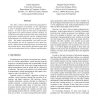Free Online Productivity Tools
i2Speak
i2Symbol
i2OCR
iTex2Img
iWeb2Print
iWeb2Shot
i2Type
iPdf2Split
iPdf2Merge
i2Bopomofo
i2Arabic
i2Style
i2Image
i2PDF
iLatex2Rtf
Sci2ools
IWPC
2005
IEEE
2005
IEEE
An Investigation into Professional Programmers' Mental Representations of Variables
Very little is known about professional programmers’ mental representations of variables, yet this information is vital in designing effective tools for program comprehension. In order to find out what types of information programmers have about variables and their relations, we conducted a knowledge elicitation study where professional programmers studied programs and the resulting mental representations were elicited using card sorting and interviews. The mental representations were based on fourteen principles that can be organized in four main categories: domain-based, technology-based, execution-based, and strategy-based. Most frequent information types dealt with two execution-based criteria: behavior and utilization.
IWPC 2005 | Mental Representations | Professional Programmers | Programmers Studied Programs | Software Engineering |
| Added | 25 Jun 2010 |
| Updated | 25 Jun 2010 |
| Type | Conference |
| Year | 2005 |
| Where | IWPC |
| Authors | Jorma Sajaniemi, Raquel Navarro-Prieto |
Comments (0)

